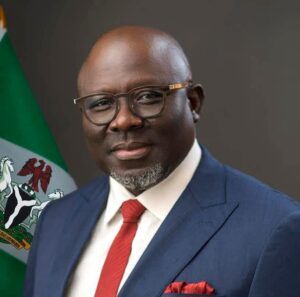
FILE PHOTO: FILE PHOTO: U.S. President Joe Biden departs the White House in Washington, U.S., for a campaign fundraiser in California, May 9, 2024. REUTERS/Craig Hudson/File Photo
* Endorses Kamala Harris to succeed him
Agency report
President Joe Biden has stood down from seeking reelection and has endorsed his Vice president, Kamala Harris as his nominee to succeed him.
[the_ad id=”16914″]
The President made the announcement on Sunday, July 21 via his X formerly called Twitter handle account.
“It has been the greatest honor of my life to serve as your President,” Biden wrote in a letter posted to his official account on X.
“And while it has been my intention to seek reelection, I believe it is in the best interest of my party and the country for me to stand down and to focus solely on fulfilling my duties as President for the remainder of my term.”
Biden said he will speak to the nation later this week in more detail.
[the_ad id=”16918″]
In a follow-up post, Biden praised Harris and urged Democrats to unite behind her.
“My very first decision as the party nominee in 2020 was to pick Kamala Harris as my Vice President,” Biden wrote. “And it’s been the best decision I’ve made. Today I want to offer my full support and endorsement for Kamala to be the nominee of our party this year.”
Biden’s departure capped off weeks of concern about the 81-year-old president’s stamina and mental capabilities and skepticism of his ability to effectively campaign against former President Donald Trump and govern the country for another four years. Biden’s decision sparked immediate calls from Republicans for him to step down as president. Trump said Biden “is not fit to serve” in a post on Truth Social.
“If Joe Biden is not fit to run for President, he is not fit to serve as President,” House Speaker Mike Johnson said in a statement. “He must resign the office immediately.”
It’s the first time a US president has dropped out of a reelection run in decades and recalls President Lyndon Johnson’s decision not to seek a second full term in 1968 – though Biden’s decision comes months later in the campaign than Johnson’s. It’s also the latest shocking development in a highly charged political campaign that has included an attempt on Trump’s life.
But not even the attempted assassination on Trump and its tumultuous effect on the race could pause the loss of support Biden was facing among congressional Democrats who became increasingly convinced that a wipeout in November would also drown their down-ballot contests as well.
Biden’s final decision to leave the race was reached in the last 48 hours, a senior campaign adviser said, as he consulted family and top advisers by telephone. He did not have a final in-person meeting with his top campaign or White House advisers as he recovered from Covid-19 at his beach home in Rehoboth Beach, Delaware.

His exit from the race sets the stage for the conclusion to a political career that has spanned a half-century, one that saw Biden enter as one of the youngest senators in US history and exit as its oldest president.
Age and questions about the president’s mental faculties had been Biden’s biggest political liability since he first ran against Trump in 2020. Biden’s disastrous performance at a June 27 CNN debate – during which the president spoke softly, had a glazed-over look and, at one point, appeared to lose his train of thought mid-sentence while his opponent delivered an animated, while mainly fact-free performance – brought those concerns to the forefront of the political conversation and ultimately doomed his reelection push.
Biden’s campaign had asked for the June debate in the hopes that it would force voters to tune into the race – and what Biden had said was at stake – earlier than usual. But that strategy appeared to backfire as the president solidified what had been the most persistent concern about his candidacy.
The president’s performance shocked his donors, closest allies and the 50 million Americans who saw Biden stumble throughout the 90-minute debate — the most extensive exposure to an unscripted Biden since the last round of general-election debates four years ago. It left the White House and Biden campaign in a frenzied scramble to explain away his condition – at first, blaming it on a cold, before days later saying the president had been jet lagged by his international travel that wrapped up about 12 days prior to the debate.
The president’s surrogates and campaign officials sought to soothe Democratic anxieties, hurriedly calling meetings with donors and top supporters to assure them that Biden’s performance was the product of one bad night and ask them to consider it in the context of his three-and-a-half-year presidency.
[the_ad id=”16917″]
The president himself recognized how poorly the night had gone almost immediately; at a campaign rally the next day, he sought to promote an animated and energized image that had largely been absent from the debate stage.
“I don’t walk as easy as I used to,” Biden said. “I don’t speak as smoothly as I used to. I don’t debate as well as I used to. But I know what I do know: I know how to tell the truth. I know right from wrong. I know how to do this job. I know how to get things done.”
But the damage had already been done.
By the Monday after the debate, murmurs about replacing Biden on the ticket had grown into a full public conversation. The mood in the White House and at Biden’s campaign headquarters in Wilmington had turned sour. Biden, seeking to assert his control over his campaign and the presidency, delivered brief remarks that evening on the Supreme Court’s immunity decision earlier that day, asking voters to “dissent” in a rare political overture from the White House.
The next day, Rep. Lloyd Doggett of Texas became the first member of Congress from Biden’s own party to ask him to drop out. The fractures in Biden’s support have grown steadily wider every day since. By the time Biden exited the race, dozens of lawmakers had asked him to bow out.
So had major donors. Actor George Clooney, who has known Biden for years and was one of Hollywood’s biggest boosters of the president, said in a July 10 New York Times opinion piece that Democrats “are not going to win in November with this president” and called for the party to pick a new nominee.
Source: cnn







